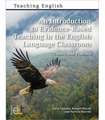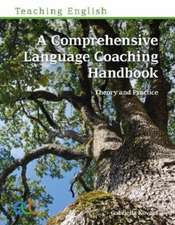Working with Emergent Language: Teaching English
Autor Richard Chinn, Danny Norrington-Daviesen Limba Engleză Paperback – 9 feb 2023
Preț: 338.15 lei
Nou
64.70€ • 67.56$ • 53.55£
Carte disponibilă
Livrare economică 14-28 martie
Livrare express 28 februarie-06 martie pentru 35.23 lei
Specificații
ISBN-10: 1803881283
Pagini: 248
Dimensiuni: 176 x 228 x 21 mm
Greutate: 0.52 kg
Editura: Pavilion Publishing and Media Ltd
Seria Teaching English
Descriere
Working with Emergent Language raises awareness of what emergent language (EL) is, highlights its importance and makes the case that focusing on EL is an essential part of learning a language and therefore a skill that every language teacher should possess or work to develop. It offers useful definitions and explains the pedagogy, alongside practical suggestions and opportunities for reflection, to help all teachers work with EL effectively and confidently.
Emerging language is any unplanned language item that arises naturally during lessons that the teacher then chooses to focus on for clarification or modification, and this pedagogy is gaining traction year on year. This book starts by drawing on the literature and the authors’ own experiences to make the case that working with EL is essential for language acquisition to occur and therefore a skill that language teachers should possess. The case is backed up by research and data from observations to explore how experienced teachers work with EL at different stages of a lesson and why they do so. To show how teachers work with EL, you will be introduced to a new framework of teacher intervention types. This draws on previous frameworks plus the authors’ own terms created following their extensive research. Transcripts and classroom commentaries from genuine lessons show how these interventions are used by teachers and why.
Part two provides awareness-raising, practice, and reflective tasks to help new and experienced teachers develop their skills with EL. Teacher trainers and educators can also use these tasks during courses, workshops, and observations programmes in schools. Through these tasks, new teachers will be able to work with EL earlier in their careers. Teacher educators can also more confidently introduce EL on their courses. Through the tasks and discussion in this section, you will learn why reflective practice is central to teacher education and development, and through the use of tasks explained in the book, teachers can also take control of their development much earlier in their careers. The final part of the book addresses typical questions and issues about working with emergent language that teachers often ask. They dispel common conceptions suggesting that working with EL is difficult or inappropriate in some contexts and situations.





